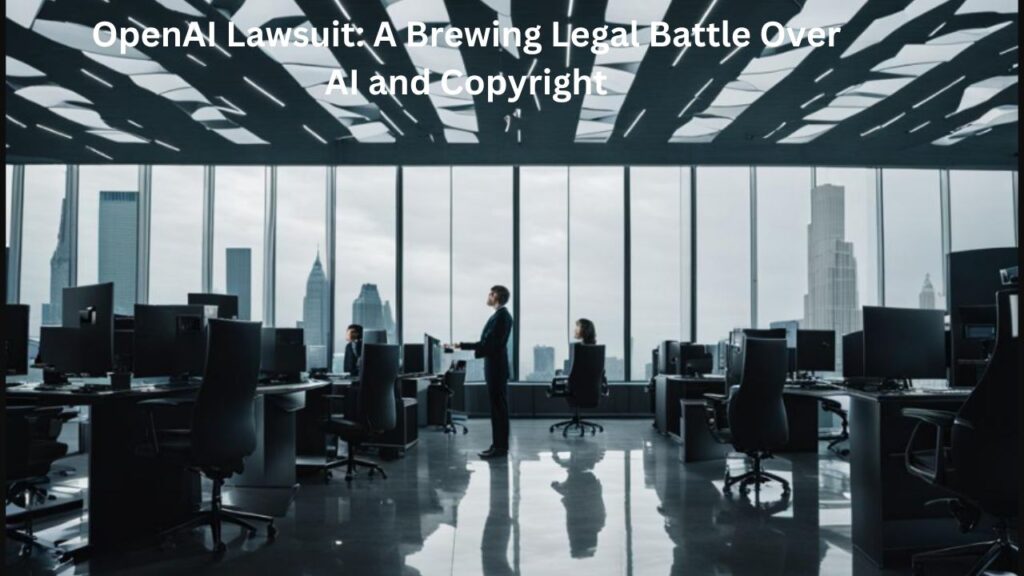OpenAI Lawsuit: The rise of bade language models (LLMs) like ChatGPT ne sparked kiya hai a growing legal battle between AI companies aur content creators over copyright infringement.
At the center of this conflict hai OpenAI, the maker of ChatGPT, jo stands accused hai of scraping millions of copyrighted articles, books, images, aur other content without permission to train its AI systems.
See Also: House Of illuminati Willy Wonka AI
OpenAI Lawsuit Causes
The root cause of the conflict hai OpenAI ka use of vast amounts of copyrighted content to develop AI systems jaise ChatGPT.
By scraping the internet aur digitizing copyrighted books aur articles, OpenAI ne build kiya hai extensive training datasets to teach ChatGPT to generate human-like text.
Major publishers jaise The New York Times allege karte hai OpenAI ne copied millions of articles without permission ya compensation to create AI products jo compete kar sakte hai ya replace original journalism.
Other plaintiffs jaise authors aur comedians make similar claims regarding books, scripts, aur other creative works used to train AI text aur image generators.
OpenAI maintain karta hai its use of copyrighted works constitutes “fair use” aur hai transformative. Lekin the ability of ChatGPT to regurgitate verbatim passages from books aur articles has undermined yeh defense.
See Also: Pinnacle Of AI And Charts The National Landscape Of Artificial Intelligence Advancement Dzqsk.Com
OpenAI Lawsuit Consequences
The New York Times ne fire kiya first shot against OpenAI aur Microsoft ek major copyright lawsuit ke saath in late 2022. Lekin bahut publishers have since followed suit, including CNN, Time, ABC News, The Guardian, aur more.
OpenAI, backed by $10 billion from Microsoft so far, lead karta hai tech industry mein generative AI. With ChatGPT’s explosive growth attracting billions in potential licensing revenue, OpenAI ke pass hai resources for a prolonged legal fight.
The startup ke bhi strong incentives hai to defend its AI training processes jaise critical to its future innovations.
Microsoft aur Google bhi have major stakes in the outcome. Microsoft ka exclusivity deal to license OpenAI’s tech could be threatened agar courts rule against fair use rights for AI training data.
Meanwhile, Google is racing to catch up in generative AI aur must watch closely how courts treat fair use claims.
See Also: NSFW AI Image Generator Perchance Free
OpenAI Lawsuit Players: Media Giants and Tech Titans
The New York Times ne shuru kiya lawsuit against OpenAI aur Microsoft for copyright infringement in 2022. Bahut publishers jaise CNN, Time, ABC News etc ne bhi file kiya lawsuits.
OpenAI, backed by Microsoft funding, leading hai in AI text generation jaise ChatGPT. It ke pass resources hai for a legal fight.
Microsoft ke liye bhi bohot kuch stake hai lawsuit mein through its deal with OpenAI. Google bhi closely follow kar raha hai case kyunki it bhi work kar raha hai on AI text tech.
Lawsuit outcome could impact these big tech companies’ ability to develop aur deploy text AI products.
So in summary, big media aur tech companies face off in this high-stakes legal battle over AI training using copyrighted content.
See Also: AdCreative AI: Free, App, Alternative & Review
OpenAI Lawsuit Timeline
- December 2022: The New York Times sues OpenAI and Microsoft for copyright infringement over use of articles in AI training
- January 2023: EU regulators announce investigation into Microsoft-OpenAI deal
- July 2023: Comedian Sarah Silverman and authors file class action suit against OpenAI
- September 2023: Groups of visual artists sue OpenAI and Stability AI over use of artwork
- February 2024: Online publishers Raw Story and The Intercept sue OpenAI and Microsoft
- February 2024: Elon Musk sues OpenAI and Sam Altman alleging breach of original mission
The pace of lawsuits has accelerated rapidly since The Times’ suit, with attacks on multiple fronts against OpenAI.
As more creators demand licenses or damages, the pressure increases for legislators to clarify copyright law regarding AI fair use rights.
See Also: AI To Human Text Converter Free
OpenAI Lawsuit Public Opinion
Overall public raiye remains positive towards AI aur uske potential benefits, lekin most log believe better laws aur oversight ki zarurat hai regarding data rights, fair use, aur responsible development ke baare mein.
In a 2023 Pew Research poll, over 60% logon ne kaha AI will have mostly positive effects on society, lekin 63% ne kaha ki aur regulation ki zarurat hai.
A 2024 Cornell University survey ne pata kiya ki 57% respondents ne socha AI training ko chahiye permission from ya compensation for copyright holders.
To jabki public largely supports continued AI innovation, clear majorities chaahte hain copyright aur data use by AI systems ko roka jaye new laws aur regulations se jo establish karega fairer sharing of benefits.
Jaise OpenAI lawsuit aur calls for legislation demonstrate karte hain, the brewing legal war over AI aur copyright will have far-reaching implications for the media, tech, aur creative sectors.
Kaise courts aur policymakers balance karenge innovation versus creators’ rights yeh shape karega future development of AI.
See Also: How To Use Vizard AI: Free Download
Conclusion
The OpenAI lawsuit represents a pivotal battle publishers aur AI developers ke beech over the legal use of copyrighted content in training intelligent algorithms.
The core issues at stake relate to zaruri public institutions jaise journalism aur future path of artificial intelligence innovation.
Jaise legal war tez ho rahi hai, pressure badh raha hai legislators aur courts par provide karne ke liye clearer fair use guidelines regarding AI systems.
Jabki public opinion supports continued AI progress, most log chaahte hain ensure karein copyright law protects creators aur fair data usage ke tahat responsible development ho emerging technologies jaise ChatGPT ka.



